
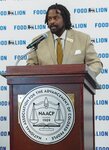
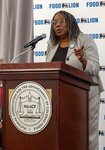
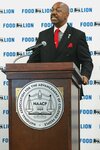

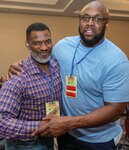
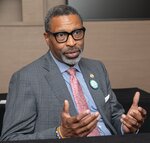



The North Carolina NAACP hosted its 81st Annual State Conference in Greensboro from September 28-30, bringing together branches from across the state for three days of seminars and workshops aimed at reigniting members’ commitment to the NAACP’s mission of racial, economic and educational equity.
According to information from the North Carolina NAACP, there are more than 120 branches, youth councils, and college chapters under the North Carolina State Conference of NAACP Branches, with the organization’s most intergenerationally diverse branches in the state, and some of the largest youth and college chapters.
“Greensboro is a phenomenal place that holds a lot of historical significance,” said NAACP Greensboro branch president, Kay Brown. “It feels amazing to host the state conference of the nation’s oldest civil rights organization, especially with Greensboro being so significant in what’s happening statewide in our gubernatorial races.”
She added, “We also want members to take away the message that all the branches and chapters statewide, need each other. We need to continue to convene and share history, share ideas, foster relationships and invest in our youth leadership.”
With a list of esteemed speakers on the agenda, much of the conference focused on the 2024 General Elections in November, with the topic of voting taking centerstage in the conversation.
The first day concluded with the conference’s public mass meeting, where Guilford County Commissioner Melvin “Skip” Alston brought forth a resolution from the board of commissioners recognizing the 81st annual state conference. As a former Greensboro branch president, state conference president and more, Alston noted the impact the organization has had on not only him, but the whole world.
“The NAACP has been a part of my life for 41 years and counting,” said Alston. “The 81st North Carolina annual state conference is just as important and necessary as the very first state conference. We’re still dealing with voter suppression, discrimination and racism. It’s the same fight, but with a different approach.”
Attendees of the public mass meeting also heard remarks from the Grandmaster ‘Daniel DT’ Thompson with The Most Worshipful Prince Hall Grand Lodge Free & Accepted Masons of North Carolina. Thompson specifically noted the national, state, and local political climate on various issues such as prescription drug costs, abortion rights, employment, housing, and more during this current election season, will require proactiveness over reactiveness.
“We must decide, define, and defend,” said Thompson. “Decide what is important to you. What are you willing to advocate for? Define your why. Why do you care about this issue? And defend. How do we defend what we decided and defined? It’s time to decide, it’s time to define, and it’s time to defend as we make our decisions to stand up for what is right and just.”
On Friday, the conference’s keynote speaker at the Carolyn Q. Coleman luncheon was Josh Stein, Democratic candidate for N.C. Governor.
“Where you come from should never limit how far you can go. We must build our economy from the bottom up; increase the minimum wage; cut taxes for working families; lift kids and families out of poverty; strengthen technical education. Every North Carolinian should get good healthcare, and I will veto any further restrictions on women’s reproductive health,” said Stein.
Also featured during the luncheon were Democrats N.C. Justice Allison Riggs (D), an incumbent candidate for the N.C. Supreme Court; and Maurice “Mo” Green, a former Superintendent of the Guilford County Schools and a candidate for N.C. Superintendent of Public Instruction.
Riggs, who was appointed by Gov. Roy Cooper in 2023 to fill the unexpired term of Michael Morgan on the N.C. Supreme Court, said, “We must win back our courts of justice. This is the most important election of our lifetime. We want to make Ms. Coleman proud. We need to elect people who work to help people from the inside.”
Mo Green initiated the audience in a call and response of, “I am a champion of public education.”
The second day also included an Armed Services & Veterans Affairs breakfast that morning and an evening town hall that focused on mobilizing the NAACP youth chapters through social media outreach and voting.
Saturday morning opened with the NAACP Leadership Breakfast, featuring keynote speaker, Derrick Johnson, president and CEO of the NAACP.
“What the NAACP does is all about community centric leadership,” said Johnson. “Community centric leadership is when you put the community interest above self-interest, and you operate from a position that we’re all equal and to ensure that maximum participation and consideration is at the table. Whoever holds the title is only temporary, but the community exists permanently.”
He also shared that effective leadership also means knowing how to teach and encourage future leaders.
“Give an opportunity and be an encouraging voice. In some cases, be a stern voice. But at all times be a voice that’s talking to them. That’s including them and allowing them to participate,” said Johnson.
Following the annual state conference, the NAACP also launched a radio ad-buy in North Carolina, as part of a nine-state campaign that continues a multiyear effort from the civil rights organization to boost Black voter turnout in the state.
“Our voices matter and they’re only getting louder in North Carolina and across the nation,” said Johnson. “We know how much work has gone into trying to suppress and silence us and we refuse to let that happen. This election day, let’s make sure we vote like our lives depend on it.”
This effort comes after the North Carolina State Conference of the NAACP requested to intervene in a case where nearly a quarter of a million voters could be removed from the state’s voter rolls ahead of the 2024 election.
“Black voters in North Carolina are a powerful catalyst in enacting change and continue to flex their muscle at the ballot box in the face of repeated attempts to muzzle their voice,” said Deborah Maxwell, president of the NAACP North Carolina State Conference. “Voter empowerment is vital across our state, ensuring Black voices are represented in our political system and our issues are front and center. The significance of our community cannot be underestimated, and this campaign will play a crucial role in mobilizing voters to the polls in November.”
In person early voting begins on October 17. General Election is November 5.